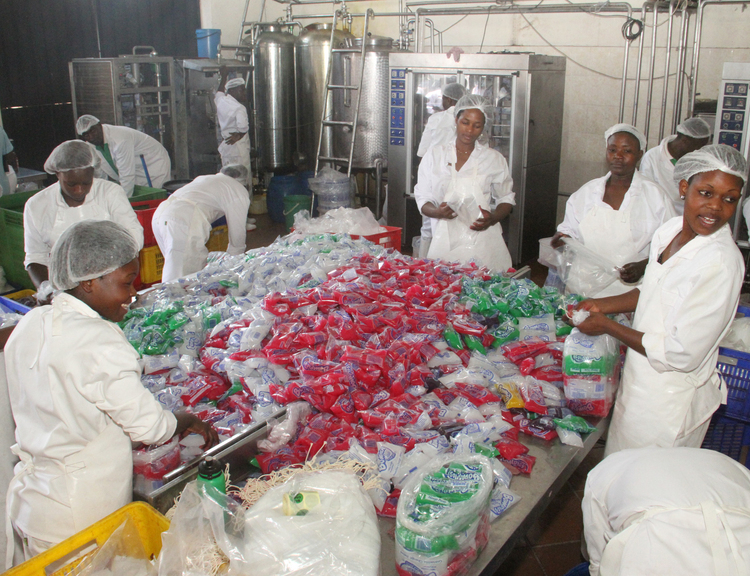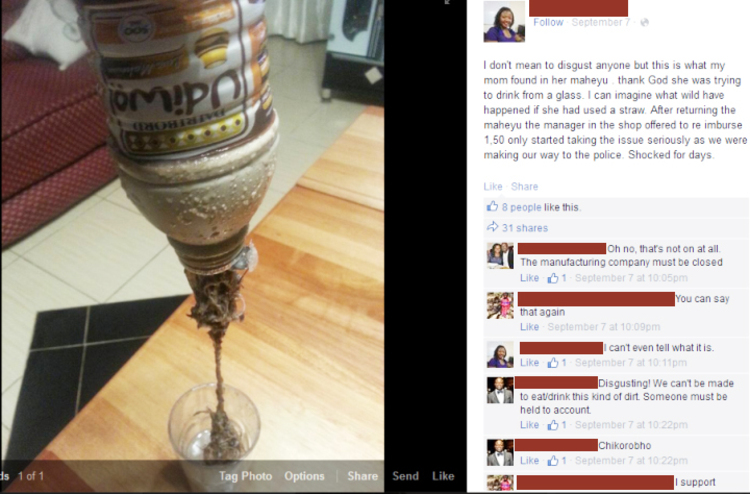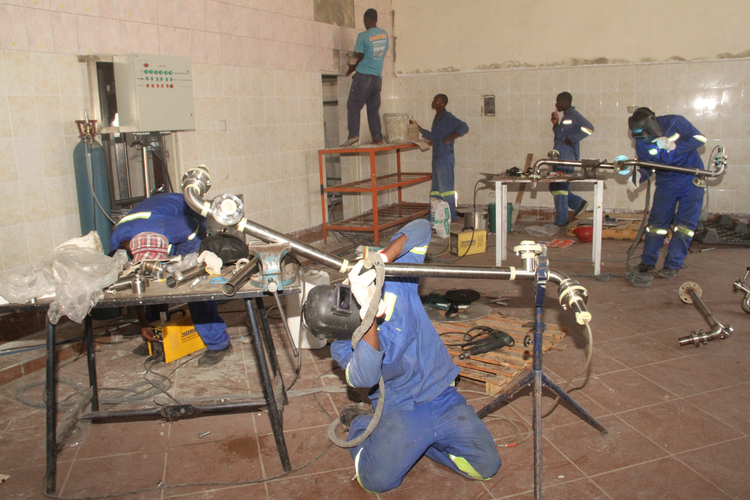
The Sunday Mail

Darlington Musarurwa
Business Editor
MR Simon Takawira, co-director of a thriving SME beverages firm in Harare, is a very relieved man.
His business almost went bust.
An anonymously generated viral message circulated via mobile social networking application WhatsApp claimed the fruit drinks and freezits manufactured by his company, Big Cool, were harmful.

Big Cool, which manufactures freezits and fruit drinks that are usually packaged in sachets, recently survived a scare after a social media message alleged that it was a foreign company manufacturing unhealthy products. It is widely believed that the message could have been generated by the company’s competitors — Picture by Kudakwashe Hunda
In one fell swoop, Big Cool almost froze to death.
Sales dropped more than 70 percent in the week after the message started circulating.
Only a sustained advertising campaign helped the company regain its footing.
Big Cool is not the only beverages company feeling the heat.
South African companies that manufacture Twizza and Dragon energy drink feel hard done by Government’s recent move to remove their products from local shop shelves.
That the ban coincides with the summer season, which traditionally results in increased consumer demand for beverages, has not helped.
Big Cool is not the only beverages firm to suffer from bad Press.
Dairibord Holdings Limited, which produces fruit drinks and traditional drink Maheu, had to deploy its PR machine after a message circulated on social media that a customer discovered a rat in one of its products.
Peculiar
Twizza Soft Drinks, a 12-year-old business headed by South African Mr Ken Clark, was removed from Zimbabwean shop shelves after it was deemed to be in violation of Statutory Instrument 265 of 2002, as the artificial flavouring was used in its two-litre grape product was not declared by name on the ingredients list.
Local authorities also say the company must use an International Numbering System (INS) instead of E-numbers.
E-numbers are usually codes for substances that can be used as food additives in the European Union.
The “E” stands for “Europe”, which makes it reasonable for local authorities to insist on an INS.
However, a food additives INS is also a European-based naming system.

This picture circulating on Facebook seriously hurt Dairibord’s Pfuko product
Mr Clark, the CEO and founder of Twizza, tells The Sunday Mail Business he finds the decision to ban his products strange.
The company says it has been audited and meets requirements of the ISO 22000:2005 Food Safety Management System, with the latest audit certificate issued on August 20, 2015.
“On the 28th September 2015, the (Ministry of) Health and Child Care in Zimbabwe sent letters to wholesalers in Zimbabwe declaring that based on analysis conducted on the Twizza Grape two-litre product, the drink is violating SI 265 of 2002, in that: The artificial flavouring contained therein are not declared by names on the list of ingredients; International Numbering System (INS) be used instead of E-numbers; The drink is imported into the country without the Permanent Secretary’s written permission.
“Based on the above facts, the (ministry), under the authority of (Dr) Gerald Gwinji (Secretary for Health) requested that all Twizza drinks be withdrawn from the shelves until proper import procedures and above violations are addressed…
“We find this alleged violation to be quite peculiar as Twizza has been audited and found to meet the requirements of the ISO 22000:2005 Food Safety Management System,” explains Mr Clark.
He further questions why the regulation seems only to affect Twizza and not Delta Corporation since “the label description used by Twizza is consistent with that used by Delta”.
“Furthermore, Delta is not using neither E-numbering system or the International Numbering System on their labels.
‘‘That begs the question – why is the Twizza product being removed from the shelves and the Delta product not? Why are the people of Zimbabwe being denied an affordable carbonated soft drink of the highest quality?”
The business has asked the Health Ministry for time to comply with standing regulations.
Dragon energy drink, which suffered the same fate as Twizza, indicated last week that its labelling — the reason why it was withdrawn on the market — as in compliance with international best
From Page 3
practices.
“Dragon Energy is produced by Kingsley Beverages Ltd under licence from Dragon Beverage Company LLC (USA). It has come to ourn attention the Health and Child Care Ministry in Zimbabwe has issued a ban on Dragon Energy based on Zimbabwe specific legislation.
“This serves to confirm that Dragon Energy, its labelling and its ingredients conform in all respects to the internationally accepted standard for products in this product class,” said Mr Francois Bezuidenhout, Kingsley Beverages finance director, in written responses to this paper last week.
Clean Hands
Delta Corporation says it has nothing to do with Twizza and Dragon’s problems.
“Please note that Delta had no involvement whatsoever in the testing or work done the the Ministry Of Health on imported beverages. We have no international to lobby for the banning or blacklisting of competitor products.
we have iconic brands under the Coca-Cola Franchise which stand which resonate with our consumers.
“We further note that the imposition of higher duties on imported beverages was not instigated by Delta.
We understand this was meant to discourage imports and address the balance of payments issues in the economy. You would note that Delta also imports some canned beverages which have been affected by the duty increase.
“We believe in optimising our value chains to deliver value to our consumers. We have recently reduced prices of both beer,
Maheu and soft drinks based on passing on the benefits of our recent investments in plant, distribution fleet and cost reductions,” said the company last week.
Government has been making efforts to protect local companies from competition from cheap imports.
In the Mid-Term Fiscal Policy Review Statement in July 2015, Finance Minister Patrick Chinamasa introduced a specific duty of USc50 per litre for carbonated soft drinks.
The falling South African rand, which has dropped by more than 14 percent against the US dollar since January 2015, is making imports from across the Limpopo cheaper than locally produced goods.
Recovery
As Harare-based Big Cool recovers, there is lingering concern about the long-term effects of the bad Press it suffered.

Despite the recent setback, Big Cool, which manufactures fruit drinks, popularly known and Bompies, is continuing with its expansion plans – picture by Kudakwashe Hunda
The business represents the green shoots of the new economy touted by the Finance Ministry, as part of the machinery used to automate it came from the auctioned assets of Nesbitt Breweries and WestBev – both local beverage companies that collapsed as a result of turbulent market conditions.
Apart from being a relatively big employer compared to other SMEs, Big Cool is a major consumer of raw materials from other businesses such as milk from local firm Dendairy.
About 3 000 six-litre milk cartons are used daily, while packaging is sourced from Treger Plastics.
Big Cool is also a major consumer of sugar.
Interestingly, the Scientific and Industrial Research and Development Centre played a major role in its product development.
SIRDC is a statutory body established in 1993 under provisions of the Research Act of 1986.
Its mandate is to carry out strategic research and development for the benefit of the manufacturing, service, agricultural and mining sectors of Zimbabwe as well as to commercialise research and development outputs.
Big Cool’s managing principal Mr Simon Takawira says negative messages circulating on social media caught the company off guard.
“Since the messages began circulating raising health concerns about our products, our business declined by more than 70 percent.
The message indicated that we are a West African business, but we are a Zimbabwean company, whose product was developed locally.
We can only speculate as to who was responsible for the message.
It could have been anyone, really.
But it really hurt the business.”



